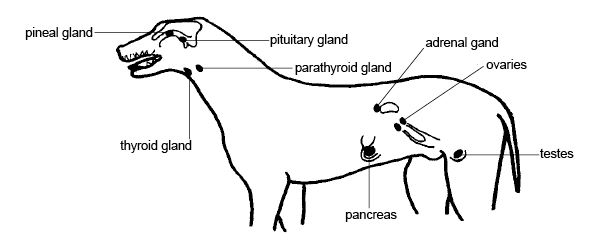Pancreatitis is an inflammation of the pancreas. Signs can include nausea and intestinal upset and can range from mild to severe. Pancreatitis can be acute or chronic. Dogs being treated for AIHA and IMHA with prednisone and azathioprine are more prone to developing acute pancreatitis.
The pancreas has several functions. It produces and releases digestive enzymes into the small intestine to digest food. It also produces insulin and releases it into the blood to control sugar levels. The pancreas is known by medical professionals as “the angry organ” because it is very sensitive and even minor irritation can result in severe pain.
Both Prednisone and Azathioprine can promote pancreatitis and it is believed that there is a synergy between the two drugs that influences this risk. Give Prednisone and Azathioprine with food to reduce the risk of pancreatitis. Using acid reducers prior to dosing of these drugs will also help reduce the risk of ulcers.
Acute Pancreatitis Signs
- Inappetence
- restlessness (arching back)
- discomfort (groaning)
- vomiting
- diarrhea (stomach cramps)
- lethargy
- pain
- heavy breathing
- fever
- sepsis (a systemic inflammatory response caused by infection)
- high or low temperature
- dehydration
- irregular heartbeat
- lying on their side may be painful because the abdomen is swollen and sensitive to the touch.
Pancreatitis is a veterinary emergency. Do not give any food or water prior to your visit. During an attack pancreatic enzymes will leak into surrounding tissues and this can lead to severe inflammation of surrounding organs. Shock may result and there is a risk of DIC (disseminated intra-vascular coagulation), a life threatening condition.
Pancreatitis Diagnosis
The most specific test is the Spec cPL (canine pancreas-specific lipase) and positive results are diagnostic for pancreatitis in a dog. Your vet may also test serum amylase and lipase (digestive enzymes in the blood), though these tests can also indicate inflammation of other organs. The cTLI (Canine Exocrine Pancreatic Insufficiency) test can determine if the pancreas is unable to manufacture enough digestive enzymes. For further diagnosis your vet may also want to perform an ultrasound, x-rays and possibly a pancreatic biopsy. Your dog may need hospitalization for appropriate veterinary care.
Pancreatitis Causes
- genetic predisposition (certain breeds are prone to it)
- obesity
- diabetes
- hypothyroidism
- infection
- a high fat diet
- recent scavenging of the dustbin (eating rubbish)
- corticosteroids
- some other drugs (including azathioprine)
- hyperlipidemia (high lipid levels)
- abdominal surgery
- recent trauma or injury (e.g. a car accident)
- a previous bout of pancreatitis
- also more common in middle aged & older dogs
Pancreatitis and pancreatic insufficiency can result in poor absorption of food. Maintaining a good weight and feeding a lower fat diet that includes high quality protein will reduce the risks of pancreatitis becoming chronic. Many dogs that have a singular attack of pancreatitis can return to a normal life with these restrictions.
For dogs with pancreatic insufficiency digestive enzymes help aid digestion and absorption of nutrients.


















































































































































































































































































































